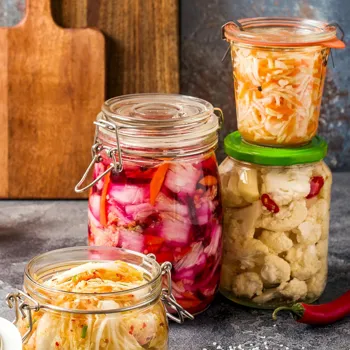Unravel the World of Probiotics: Boost Your Gut Health
Dive into the realm of probiotics and discover how they enhance your well-being
In the bustling landscape of Indian cuisine and lifestyle, where spices
reign supreme and traditions run deep, a quiet revolution is brewing in the realm of health and wellness – the rise of probiotics and a growing awareness of gut health.
Far from being a fleeting trend, understanding the importance of a balanced gut microbiome is proving to be a cornerstone of overall well-being, impacting everything from digestion and immunity to mental clarity and energy levels.
So, let’s delve into this fascinating world of probiotics and discover how they can contribute to a healthier, happier you.
Digestive discomfort signals gut health; probiotics maintain balance
We all know that feeling of digestive discomfort after indulging in spicy street food or a rich festive meal. Sometimes, it's simply overindulgence, but often, it can be a sign that your gut is not functioning at its optimal level.
The gut, also known as the gastrointestinal tract, is home to trillions of bacteria, both good and bad, collectively known as the gut microbiome. This microbial ecosystem plays a crucial role in digesting food, absorbing nutrients, and even producing essential vitamins.
Probiotics are live microorganisms, often referred to as "good" bacteria, that, when consumed in adequate amounts, confer a health benefit on the host. Think of them as the friendly reinforcements that help maintain a healthy balance within your gut.
Probiotics in traditional Indian foods for health benefits
Probiotics are not a new discovery; they have been present in traditional Indian foods for centuries. Fermented foods like yogurt (dahi), buttermilk (chaas), and idli/dosa batter are naturally rich in probiotics.

These foods have been consumed for generations, not just for their taste, but also for their health-promoting properties.
However, with the modern diet often lacking in these traditional staples and laden with processed foods, it's becoming increasingly important to actively incorporate probiotics into our daily lives.
This can be achieved through probiotic-rich foods or, in some cases, with the guidance of a healthcare professional, through probiotic supplements. Understanding the specific strains of bacteria and their potential benefits is key to making informed choices.
Probiotics boost digestion, immune system, and mental health
Now, let's understand the specific benefits that probiotics offer. Foremost is digestive health. Probiotics support healthy digestion by helping to break down food, reduce bloating and gas, and alleviate symptoms of irritable bowel syndrome (IBS).
They can also be beneficial in managing diarrhea, especially antibiotic-associated diarrhea, which can occur after a course of antibiotics that disrupt the natural gut flora. Furthermore, a healthy gut microbiome is directly linked to a stronger immune system.
A significant portion of our immune cells resides in the gut, and probiotics help stimulate these cells, making us more resistant to infections and illnesses. Research also suggests a connection between gut health and mental well-being, often referred to as the "gut-brain axis”.
Probiotics may influence mood, cognitive function, and even reduce symptoms of anxiety and depression.
Various ways to consume probiotics: yogurt, buttermilk, fermented veggies, enriched foods, supplements
There are several ways to incorporate probiotics into your diet. Yogurt, especially varieties with live and active cultures, is an excellent and readily available source. Buttermilk, a refreshing and cooling drink, is another good option, particularly during the hot Indian summers.

Fermented vegetables like kimchi and sauerkraut, although not traditionally Indian, can be easily incorporated into your meals. In addition to these, you can find probiotic-enriched foods like cereals, juices, and even breads.
However, it's crucial to read the labels and ensure that the product contains live and active cultures and a sufficient quantity of bacteria to provide a health benefit.
For those who find it challenging to obtain enough probiotics through food alone, probiotic supplements are available in various forms, including capsules, powders, and liquids.
People embrace understanding for positive impact
Many people have already begun to understand impact. Taking the initiative to learn more is a positive outlook.
Choose the right probiotic with professional guidance for individual needs
Choosing the right supplement can be overwhelming, so it's best to seek guidance from a doctor or registered dietitian. There are various strains of probiotics, each with unique properties.
For instance, some strains are more effective for digestive health, while others are better for immune support. A healthcare professional can help you select the right probiotic based on your individual needs and health goals.
When starting a probiotic supplement, it's essential to start with a low dose and gradually increase it over time to allow your gut to adjust. It's also important to be patient, as it may take a few weeks to notice the full benefits of probiotics.
Embrace probiotics for gut health and overall well-being
In conclusion, embracing probiotics and prioritizing gut health is an investment in your overall well-being.
By making conscious dietary choices, incorporating probiotic-rich foods, and considering supplementation when necessary, you can nurture a balanced gut microbiome and reap the numerous benefits it offers.
While probiotics are generally safe for most people, it's always best to consult with a healthcare professional before starting any new supplement, especially if you have underlying health conditions.
Focus on gut health for a happier and healthier you
Remember, a healthy gut is a happy gut, and a happy gut leads to a healthier and happier you. So, take the first step towards a healthier future by focusing on your gut health today!
AI Generated Content. Glance/InMobi shall have no liability for the content













